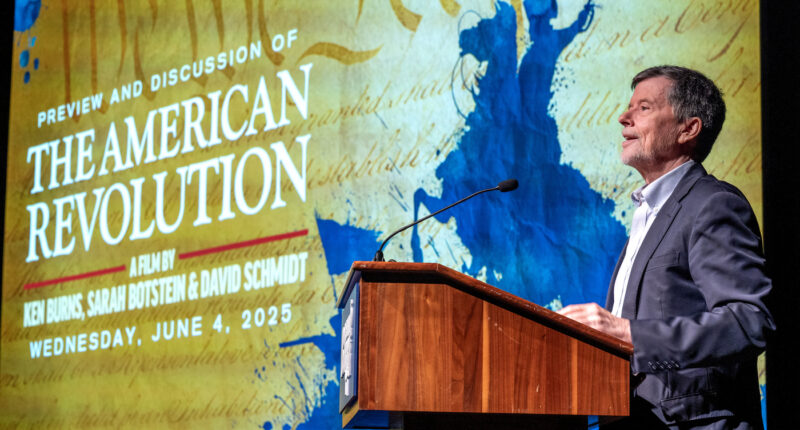As we approach the Quarter-Millennial anniversary of American independence, it remains to be seen whether that important milestone will offer a fitting and substantial tribute to America’s history and heroes — like the spirited and patriotic Bicentennial did — or will fail to capture the public imagination.
Ken Burns’s new documentary, The American Revolution, which premieres Nov. 16, sets the table for the Quarter-Millennial festivities, and it is a good opening shot. It will remind Americans that this is a chance to celebrate, in the words of Alexander Hamilton, “the fate of an empire in many respects the most interesting in the world.”
Burns’ film, which primarily covers the period from 1775 to 1783, provides a thorough overview and detailed description of the strategy, tactics, politics, moral dimensions, and day-to-day hardships and violence faced by the combatants and civilians affected by the American Revolutionary War. What comes through in the film is that we should have gratitude toward both our founders and the ordinary soldiers who fought for our independence. The incredible sacrifices that they made are evident at every turn.
Burns’s self-described goal is to return us to our “origin story.” In this, he succeeds. It is a story of patriotism, incredible courage, perseverance, luck, divine providence, and a final American victory against seemingly impossible odds. Burns also tells stories of calculated self-interest, the ruthlessness of slavery, the betrayal of Indian allies, and the not surprising preference of many slaves and Indians for the British side of the conflict.
Many people will conclude that the film contains too many land acknowledgements and references to “enslaved people.” But overall, Americans both young and old who absorb Burns’ story will be inspired, and most will come away with a deep gratitude for what our eighteenth-century forebearers bequeathed to us.
Burns argues that a story that depicts both noble and ignoble actions, both overarching ideals and nitty-gritty details, is more inspiring in the end. The New York Times writes that this approach “certainly cuts against the Trumpist view of history,” which the Times characterizes as lacking nuance and glossing over all unpleasantness. In truth, it is the leftist portrayal of history that eschews nuance and views America’s complex story through a simplistic, one-dimensional, oppressor-versus-oppressed lens. In telling our nation’s origin story in vivid detail, Burns allows the world-historical achievements of our founding generation to shine through in full color.
When we recently interviewed Burns, he said he couldn’t agree more that America’s political leadership class at our founding was among the finest, if not the finest, in the history of the world. Topping that leadership class was George Washington.
Burns’ documentary provides a compelling narrative, illuminating maps, other captivating visuals, and a welcome focus on our fight for independence. But perhaps the film’s most important contribution is how effectively it reacquaints Americans with George Washington’s heroics. It would be hard to come away from Burns’s documentary without a renewed appreciation for Washington, who comes off as by far the biggest hero. Indeed, the film might do more to reset Americans’ view of Washington — to teach them about his glorious achievements in a way that most of our schools no longer do — than anything has in quite some time.
Burns told us that “without a question,” Washington is the greatest hero of the Revolution, declaring, “We don’t have a country without him.” This is abundantly clear from the film, as Washington’s leadership, bravery, determination, perseverance, devotion to republican ideals, and opposition to centralized power and control are constantly in evidence.
When talking to us, Burns also noted the founders’ emphasis on virtue and self-sacrifice:
“Washington spent most of the six and half years of the war in a tent, not home. He may have been the wealthiest person in America. So he’s also mutually pledging not only his life … but his fortune — I wonder if the richest people in the world are willing at any time to risk that — and [his] sacred honor, which is, I think, at the heart of all of this. And the free electron that turns up in the quotes that we’ve assembled over the ten years it’s taken us to do this — the free electron is the word ‘virtue.’ And I think that’s sort of … missing from our conversations today.”
The American Revolution came perilously close to failing, as the patriots almost lost multiple times. This point is made most evident in perhaps the best of the film’s six installments, episode three. Even before the end of the summer in which the Declaration of Independence was signed, New York almost became a sort of Yorktown in reverse, with Washington and his men trapped on a peninsula. The American army was saved only by a retreat aided by a providential rain, wind, and fog. That same episode also covers the bleak situation near the very end of 1776, when Washington decided to cross the Delaware and attack the Hessians at Trenton. These are stories that are rarely told anymore in public schools and badly need to be heard.
The weakest moments in the film come from some of the academics or authors who are quoted. One calls Washington an “enslaver,” falsely suggesting that he rounded up free men and put them into bondage, instead of what he was: a slaveowner. Another says, “I think the American Revolution was all about land,” despite the abundant evidence throughout the film that the Americans were risking their homes and their livelihoods — as well as their lives — to be a free and self-governing people.
In the film’s last line, Benjamin Rush says, in words that play like an endorsement of a continuing progressive revolution, “The revolution is not over.” In truth, Rush uttered those words before the Constitutional Convention took place. Now that we have a glorious Constitution, we need to preserve it, not transform it, as the progressives would have us do.
Happily, the narrator never makes such questionable assertions as some of the experts do, and many of the chosen quotes are quite illuminating and affecting. Thomas Paine’s Common Sense is quoted at length, inspiringly. (Strangely, Patrick Henry’s “Give Me Liberty!” speech is omitted.) King George III is quoted after the war as saying that Washington is “the greatest character of the age.” And a German soldier captured at Yorktown marvels, “With what soldiers in the world could one do what was done by these men? … Who would have thought, a hundred years ago, that out of this multitude of rabble would arise a people who could defy kings?”
Such words are a fitting start to a Quarter-Millennial anniversary that should continually remind us that the story of our nation, a story conceived in liberty, is one of the great stories in the history of mankind.








